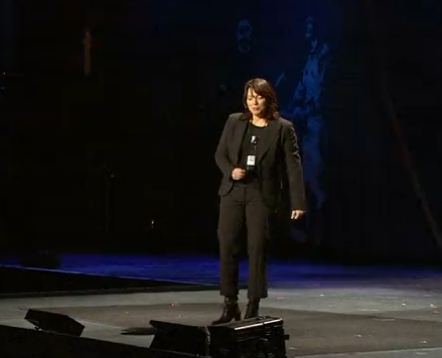So we see Pranav here going into the supermarket and he's shopping for some paper towels.
我们看到Pranav现在去了超市,他打算买一些纸巾。
And, as he picks up a product, the system can recognize the product that he's picking up, using either image recognition or marker technology,
当他拿起一种纸巾时,系统会通过图像识别或者是标识技术,自动识别这种纸巾,
and give him the green light or an orange light. He can ask for additional information.
然后显示一个绿灯或者是橙灯。他可以取得更多信息。
So this particular choice here is a particularly good choice, given his personal criteria.
所以现在这个选择,根据他个人的标准,是一个最佳选择。
Some of you may want the toilet paper with the most bleach in it rather than the most ecologically responsible choice.
你们有些人可能想要含有最多漂白剂的厕纸,而不是最环保的厕纸。

If he picks up a book in the bookstore, he can get an Amazon rating -- it gets projected right on the cover of the book.
当他在书店拿起一本书时,他会获得亚马逊网站对于这本书的评价--这些信息直接被投影到书的封面上。
This is Juan's book, our previous speaker, which gets a great rating, by the way, at Amazon.
这本是之前的演讲者Juan的著作,在亚马逊大受好评。
And so, Pranav turns the page of the book and can then see additional information about the book
然后,当Pranav翻开这本书,会看到这本书的更多相关信息
reader comments, maybe sort of information by his favorite critic, etc.
读者评论,他最喜欢的书评家对于此书的评论等等。
If he turns to a particular page, he finds an annotation by maybe an expert or a friend of ours
如果他翻到特定的某页,他会看到我们的朋友中的某个专家所作的一个注脚,
that gives him a little bit of additional information about whatever is on that particular page.
给他提供一些关于这一页的附加信息。
Reading the newspaper -- it never has to be outdated.
看报纸的时候,永远都有最及时的信息。



